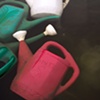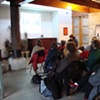
Three Gardens Conversation
Experimental Station, Chicago, USA 2010
The Invisible Institute, Chicago, fronted by social writer and human rights activist Jamie Kalven, developed a project, The Garden Conversations, concerning the imminent closure of a community garden, at 61st Street and Dorchester Avenue. The garden, located in a less affluent and 'contested' neighbourhood of Chicago, was a social tool for the local community; a place to meet, grow food and connect with nature. The community garden land had been on loan from the University of Chicago (UoC) since 2000. Ten years later the UoC required the land back so it could be used as a staging area for the construction of new university building on an adjacent street. Gardeners were to be evicted by October 2010. The Garden Conversations project, documented and posted daily videos from the gardens of 61st Street Community Garden leading up to the closure of the garden.
Campbell and Greek artist Stefania Strouza, discovered the work of The Invisible Institute whilst conducting research on their own involvement with garden projects. They organised a collaborative public talk with Kalven, the Three Gardens Conversation, at The Experimental Station whilst on a residency in Chicago. The event was hosted by Dan Peterman - Environmental Artist, Associate Professor Studio Arts at University of Illinois at Chicago and Co-Founder of the Experimental Station. Campbell talked about her involvement as an artist at Saughton Park, Edinburgh, and Strouza, her observations of an unprompted garden in Athens, Navarinou Park, that arose following the fatal shooting of a 15 year old boy during the 2008 riots. Kalven spoke about issues concerning the closure of the 61st Street Community Garden. Many points raised in the open discussion, touched upon themes that Campbell and Strouza had already considered and researched in Edinburgh: the contemporary use of land; the politics of public space; the value of land; systems of management; food production; the garden as a social tool and the artist’s role in gardens. Although miles apart, there was much common ground between the three gardens.
The Invisible Institute, Chicago, fronted by social writer and human rights activist Jamie Kalven, developed a project, The Garden Conversations, concerning the imminent closure of a community garden, at 61st Street and Dorchester Avenue. The garden, located in a less affluent and 'contested' neighbourhood of Chicago, was a social tool for the local community; a place to meet, grow food and connect with nature. The community garden land had been on loan from the University of Chicago (UoC) since 2000. Ten years later the UoC required the land back so it could be used as a staging area for the construction of new university building on an adjacent street. Gardeners were to be evicted by October 2010. The Garden Conversations project, documented and posted daily videos from the gardens of 61st Street Community Garden leading up to the closure of the garden.
Campbell and Greek artist Stefania Strouza, discovered the work of The Invisible Institute whilst conducting research on their own involvement with garden projects. They organised a collaborative public talk with Kalven, the Three Gardens Conversation, at The Experimental Station whilst on a residency in Chicago. The event was hosted by Dan Peterman - Environmental Artist, Associate Professor Studio Arts at University of Illinois at Chicago and Co-Founder of the Experimental Station. Campbell talked about her involvement as an artist at Saughton Park, Edinburgh, and Strouza, her observations of an unprompted garden in Athens, Navarinou Park, that arose following the fatal shooting of a 15 year old boy during the 2008 riots. Kalven spoke about issues concerning the closure of the 61st Street Community Garden. Many points raised in the open discussion, touched upon themes that Campbell and Strouza had already considered and researched in Edinburgh: the contemporary use of land; the politics of public space; the value of land; systems of management; food production; the garden as a social tool and the artist’s role in gardens. Although miles apart, there was much common ground between the three gardens.






